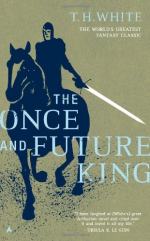|
|
The Once and Future King Topic Tracking: Duty
Book 1, Chapter 13
Duty 1: The ants feel blind duty, and that is all they feel. They cannot differentiate between right and wrong, and they love their leader uncritically. They do not even appreciate the ancient origins of their religion or their orders: their only satisfaction is in completing their jobs.
Book 1, Chapter 16
Duty 2: King Pellinore feels no personal anger toward the Questin' Beast. He simply feels that, since everyone in his family before him has hunted it, he should hunt it too. However, when he has a chance to kill it, he doesn't. Instead, he nurses it back to health. He feels he has a duty to hunt the Beast, for its own good (it gets sick when no one hunts it, because it thinks no one cares about it.) When he stops hunting it, he gets upset with himself, feeling like he has forgotten his duty, even though his relationship with the beast doesn't make much sense, since he never wants to actually catch it.
Book 1, Chapter 19
Duty 3: The geese have an understanding of duty that the ants do not. They feel instinctively what needs to be done in order for everyone to be as peaceful as possible, and they do it. Unlike the ants, they do not blindly serve one leader. Instead, they all make their own decisions, but in such a way that it benefits the whole group. They are organized without being restrictive.
Book 1, Chapter 20
Duty 4: Arthur has somehow developed a sense of knighthood that is different from any of the knights he knows: he feels a great duty to the world. He wants to rid it of evil, and he is willing to sacrifice a great deal to do it. Neither Kay, nor Sir Ector, nor Grummore or Pellinore seem to feel this way.
Book 1, Chapter 23
Duty 5: Even though moments before, Sir Ector was Arthur's adopted father, and Kay was Arthur's master, as soon as they realize Arthur is King, they fall to their knees. Their sense of duty to the King, whoever he may be, overrides any personal feelings they have for Arthur.
Book 3, Chapter 6
Duty 6: Lancelot tries to crush his love with his sense of duty. Even though he loves Guenever, he believes his loyalty to the King-and to his own ideas of Right and Wrong-are more important.
Book 3, Chapter 17
Duty 7: Lancelot rescues people even when he doesn't want to, because he can't help himself-he feels completely bound to his sense of duty.
Book 3, Chapter 36
Duty 8: Arthur feels he has a duty to his country, since he has so unexpectedly been made king. He understands what it is like to be powerless (he has been bullied by Kay all his life) so he wants to protect his powerless citizens. This is where the idea of the Round Table begins--and ends.
Book 4, Chapter 8
Duty 9: Gawaine feels such a duty toward his family that he becomes completely lost without them, and is obsessed with avenging his brothers' deaths.
Duty 10: Even as Arthur says he loves the Queen, he argues that he must be just with her: since she has done wrong, she must be punished, whether he wants her to be or not. Mordred, at the same time, uses Arthur's conviction to manipulate him.




